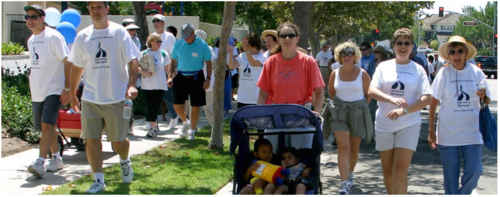Welcome To Our Vibrant Reconstructionist Congregation

A Joyous Approach to Jewish Life
At University Synagogue, our mission is to be the center of innovative and dynamic Judaism in Orange County. If you are looking for an open atmosphere where you can learn, engage, celebrate and experience Judaism, you will find University Synagogue both comfortable and meaningful. We are committed to reaching out to all who are interested in Judaism, including interfaith couples and anyone in search of a modern, rational and joyous approach to Jewish life.
Modern Judaism and Meaningful Connections
At University Synagogue, we call ourselves a congregation, but we think of ourselves as an extended family – an authentic caring community. We have a dynamic Rabbi, an inspiring Cantor, and wonderful educators who lead our Pre-School and Religious School. What unites us is a love of tradition and a desire for innovation. We do what Jews have always done; we weave the beauty of our heritage with the scientific and philosophical truths that we have learned in our lives.
Our History

Coming Together
University Synagogue was founded in 1987 by sixteen men and women who were studying Reconstructionist Judaism and the philosophy of its founder, Rabbi Mordecai Kaplan. They formed a havurah (small fellowship) and invited Rabbi Arnold Rachlis, then serving a Reconstructionist synagogue in the Chicago suburb of Evanston, to speak.
Creating A Congregation
Shortly after Rabbi Rachlis’ first visit to Orange County, the havurah decided to hold High Holiday services and over a hundred people attended. Throughout the next few years, a great deal of interest resulted from Rabbi Rachlis’ visits with over 200 people attending each service. The havurah, renamed University Synagogue, pursued the idea of forming a permanent congregation.
Welcome To All
A major part of our growth has been our strong appeal to unaffiliated Jews, interfaith households, LGBTQ community – people who have often felt disenfranchised from Jewish life. We were one of the synagogues in Orange County to welcome interfaith families and Rabbi Rachlis performs interfaith marriages with joy. Our congregation finds profound meaning in connecting Jewish tradition with the ins and outs of life in the modern world.
about reconstructionism
Our Philosophy
As envisioned by founder Rabbi Mordecai Kaplan, Reconstructionist Judaism is a progressive, contemporary approach to Jewish life. It integrates a deep respect for the traditions of Judaism with a modern social, intellectual and spiritual life.
The Jewish Experience
For Reconstructionists, Judaism is more than religion; Judaism is the entire cultural legacy of the Jewish people. Religion is central and Jewish spiritual insights and religious teachings give meaning and purpose to our lives. Yet our creativity as expressed through art, music, drama, languages and literature, and our relationship with history and tradition are also integral parts of Jewish culture. Each of these aspects provides a gateway into the Jewish experience that can enrich and inspire us.
Humanistic
In Reconstructionism, we believe that God is that spirit within us, and within the universe, which helps us become loving and caring people; that power which we perceive through reason, experience and intuition that urges us towards self-fulfillment and ethical behavior. We find God by understanding ourselves, by being morally concerned, and by being motivated to study and live as Jews.
There Is No Right Way To Be A Jew
Each person is actively urged to study Jewish tradition and then to select those ideas and mitzvot that are personally and spiritually meaningful. There is also no single definition of a “good Jew” – some will find meaning in kashrut and Shabbat, others in study, still others in Jewish culture, Zionism or social action. What is important is that each Jew acquires a mature and sophisticated level of knowledge about Judaism, so that his or her choices will be informed and educated ones.



